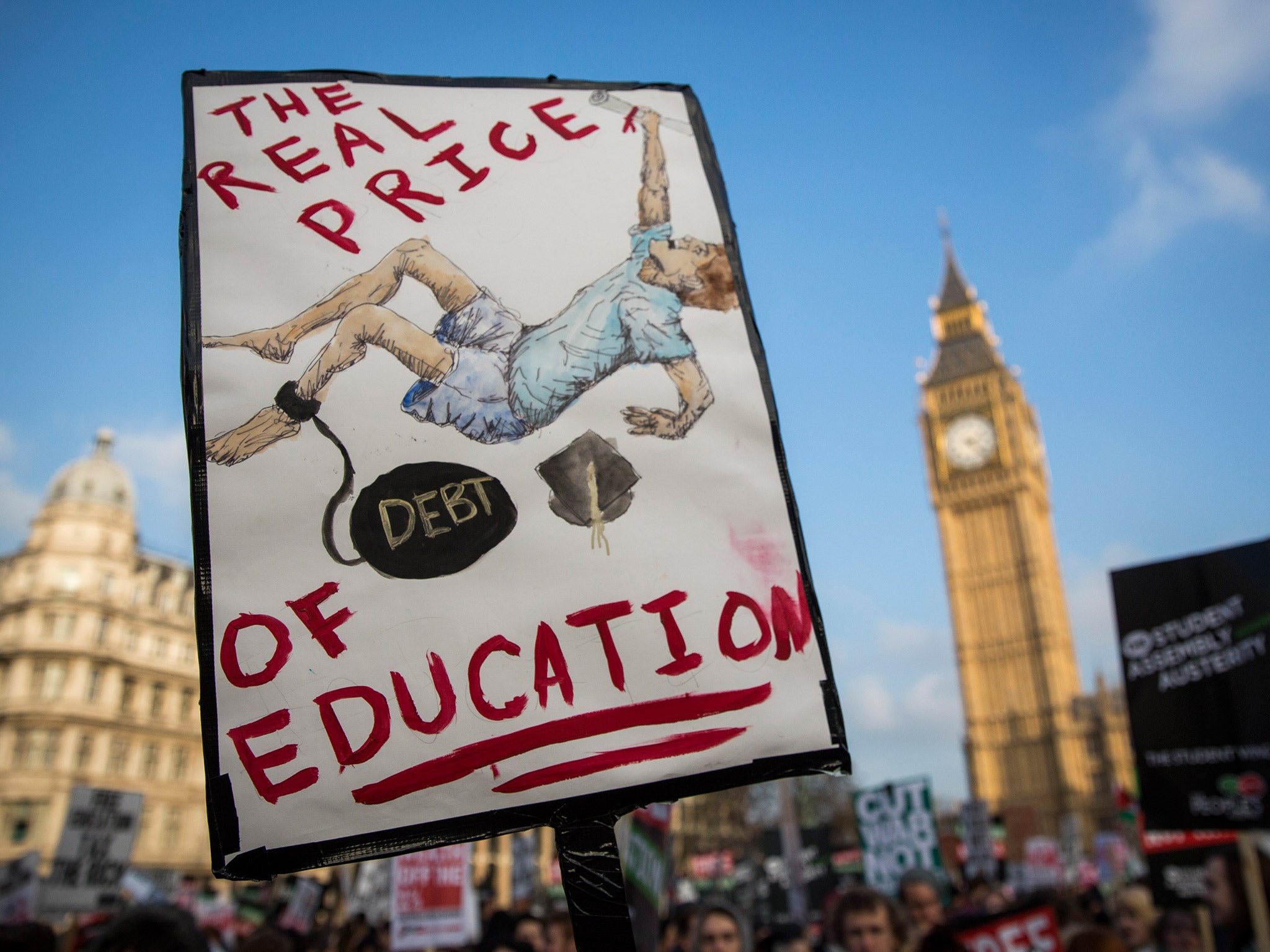Tories have ‘maxed out the nation’s credit card’ with young people paying the bill, student loans debate hears
Labour MP describes how 'a commercial organisation would not be able to do this,' as chamber debates Government's retrospective hike

Your support helps us to tell the story
From reproductive rights to climate change to Big Tech, The Independent is on the ground when the story is developing. Whether it's investigating the financials of Elon Musk's pro-Trump PAC or producing our latest documentary, 'The A Word', which shines a light on the American women fighting for reproductive rights, we know how important it is to parse out the facts from the messaging.
At such a critical moment in US history, we need reporters on the ground. Your donation allows us to keep sending journalists to speak to both sides of the story.
The Independent is trusted by Americans across the entire political spectrum. And unlike many other quality news outlets, we choose not to lock Americans out of our reporting and analysis with paywalls. We believe quality journalism should be available to everyone, paid for by those who can afford it.
Your support makes all the difference.The Tories have “maxed out the nation’s credit card” and now students and graduates are being left to foot the bill, a parliamentary debate on a retrospective loan hike has heard.
The hard-fought-for debate was led by Helen Jones, Labour MP for Warrington North and chair of the Petitions Committee who, in her opening remarks, said “what’s happening at the moment is simply and totally wrong.”
In a hard-hitting statement which was echoed by other MPs throughout the debate, Mrs Jones also said: “The worst thing about this decision is it is retrospective. A commercial organisation would not be able to do this, but the measures it imposes on others it appears [the Government] is not prepared to adhere to itself.”
The debate was triggered following mass outrage when the Government made a U-turn on a 2012 promise by freezing the student loan repayment threshold at £21,000, meaning graduates are now being forced to pay back more on their loans than originally promised.
More than 130,000 people signed a petition, calling on the Government to overturn its decision which said that, by introducing retrospective changes, it “threatens any trust had in the student finance system.”
The petition had originally been rejected, however, Labour MP for Walsall South, Valerie Vaz, was pivotal in helping to secure the debate in June after coming face-to-face with Universities Minister, Jo Johnson, in the House of Commons.
Daniel Zeichner, Labour MP for Cambridge, took time to read a letter from one of his constituents at the debate who wrote: “It breaks my heart to see my family saddled with huge debt.”
Labour MP for Ilford North, Wes Streeting, urged the Government to “come forward with alternative proposals that don’t lead to future Governments changing conditions,” as Mrs Jones said: “There is a chance with a new Chancellor in place to revisit this, and I urge him to take that chance.”
Liz McInnes, Labour MP for Heywood and Middleton, said the Conservatives’ “reckless” actions meant they had “maxed out the nation’s credit card,” for which the young are now footing the bill, adding how the change was a “moral issue” and that “we cannot play politics with people’s education.”
Mr Johnson was the only Tory present at the debate and, at the end, sought to address concerns by insisting the move ensures England’s higher education system is on a “sustainable footing.” He also described how university graduates today “benefit hugely” in terms of jobs compared with non-graduates, meaning higher salaries. He said: “We need to make sure higher education funding remains sustainable.”
However, according to consumer champion Martin Lewis, who has been tirelessly campaigning for the Government to change its mind, Mr Johnson’s summary was “much like we’ve heard before.”
In the end, the majority of MPs voted to see changes related to the student loans agreement as outlined in the petition, but Mr Lewis said after the debate there was “no real vote,” adding that he knew “it wouldn’t deliver anything.”
However, he explained how the fight for the decision to be overturned would continue and that he would aim to get a meeting with new Prime Minister Theresa May and that, ultimately, the decision lies with the Treasury which he hopes will make the change.
Prior to the debate taking place, Mr Lewis said: “This is just as much a moral issue as a legal one. A retrospective change will destroy any trust current and future generations can have in the student finance system, and perhaps, even more widely, in the political system as a whole.” He also described the retrospective change as “a national disgrace.”
Sorana Vieru, vice president of higher education with the National Union of Students, said the campaigner “wholeheartedly shares” the concerns of the thousands of students who signed the petition which led to the debate, as well as of the many MPs who challenged Mr Johnson on the “deep unfairness” of freezing the repayment threshold.
She told the Independent: “The move not only undermines faith in the higher education funding system, but in government more generally. The Government’s £9,000 fees system is a failed experiment, leading it to go back on its promises only four years in. The system failed on its own terms and, rather than simply adding further costs onto students, the Government should be honest about the fact we need a new, fairer, and genuinely progressive and sustainable system for funding higher education.”
Join our commenting forum
Join thought-provoking conversations, follow other Independent readers and see their replies
Comments